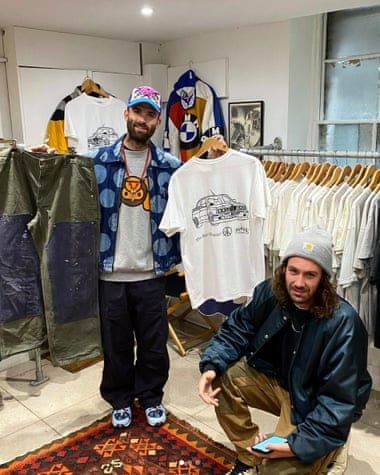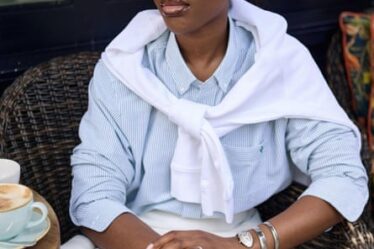
On the face of it, 194 Local looks like any other secondhand shop in London’s Brick Lane. The graffiti covered shutters are down and the shopfront is understated. But as soon as it opens at 11am, the store is packed with stylishly dressed young people. The queue for the changing cubicle is long and the shop assistant is inundated with questions.
What’s everyone there for? To get their hands on the latest vintage military overpants, a pair of £98 baggy trousers that are right on trend for men and women. Within minutes, most sizes have sold out.
“I’ve been waiting for these for a very long time and when 194 Local posted about them online, I immediately booked the day off work,” said Billy Bingham, 19, who travelled the 40 minutes by train from Essex to get a pair in black. I’ve got them in white from a different place but when it comes to vintage quality and rarity 194 is the best. It’s the spot I go to straight away.”“
His friend Ellis Taylor, 19, agreed: “I got the brown pair. I really like them and they just fit well.”
Unlike most retailers who buy in bulk, everything in these shops is hand selected. “Curated vintage” shops are popping up on high streets across the country as online outlets increasingly move to physical premises. Stock is selling out straight away and they are dictating fashion trends and reviving brands. Last week, Avirex, a popular New York-based outerwear brand, opened a pop-up shop in London’s Shoreditch after seeing a rise in demand for its vintage items.
“We’re getting busier and busier,” said Ned Membery, founder of Dukes Cupboard in Soho, which began online and with a stall on Portobello market. “People are really into secondhand clothing and it just feels like that’s the way the world is going. With so much good stuff from the late 90s and Y2k era, everyone wants a piece of it.” Alex Powis, art director and author of Sneakers Unboxed: Studio to Street, agreed. “They’re having a big moment. People love vintage because, when done right, it offers a powerful combination of authenticity and scarcity. These aren’t the thoughtless retro shops that we had growing up. Instead, they’re now curated and considered.”
As well as driving the oversized trouser trend, many credit the recent relaunch of Avirex to vintage stores in the UK, with the store stocking pieces from the 80s, 90s and 00s. Labels such as Von Dutch and Ed Hardy are also having a revival, alongside the comeback of old band T-shirts. “They’re bringing back brands and making a success of physical stores at a point when the high street is supposed to be struggling. It really is something,” said Powis.
But it is expensive and there is no rummaging through the racks for a bargain. At 194, a tired-looking Lee Scratch Perry T-shirt will set you back £89 and a Robert Plant one is £72. A Stone Island jacket from Manchester’s Gone Fishing store costs £200. At the Avirex pop-up shop, leather jackets sell for hundreds of pounds.
With items carefully sourced from all over the world, shops say they are worth the money. “We get some from boot sales and markets but we also have high-profile celebrity contacts who we buy stuff off. We get fussier and fussier all the time,” said Membery.
Matt Sloane, founder of Jerks, runs an online site and now has an appointment-only vintage studio in Bermondsey, south London. He says they try to keep prices low but the items cost a lot of money to find. “You can order 500 checked shirts and put them on a rail for 20 quid in a shop, but that’s boring and not an exciting offering for anyone. I like the idea of cherrypicking things that have some cultural relevance.”
The transition from online to physical stores could be about more than fashion. Online sites such as Depop, the secondhand fashion resale app, claim to foster a community, and TikTok’s #vintagebandtee hashtag has almost four million views.
But with old-style TVs in the windows and rows of 90s band tees, shops can feel like a step back in time.
Caryn Franklin, fashion commentator, said vintage is about making a statement. “We’re looking for niche places that we can step into and experience a whole vibe and ambience. A space that has been created like an installation is inherently gratifying. It’s a community where you meet like-minded people.”
Powis agrees. “For a generation that has grown up with Instagram, digital shopping and targeted ads, these shops offer in-person communities in a way that the pioneers of streetwear did with their stores back in the 90s,” he said.


